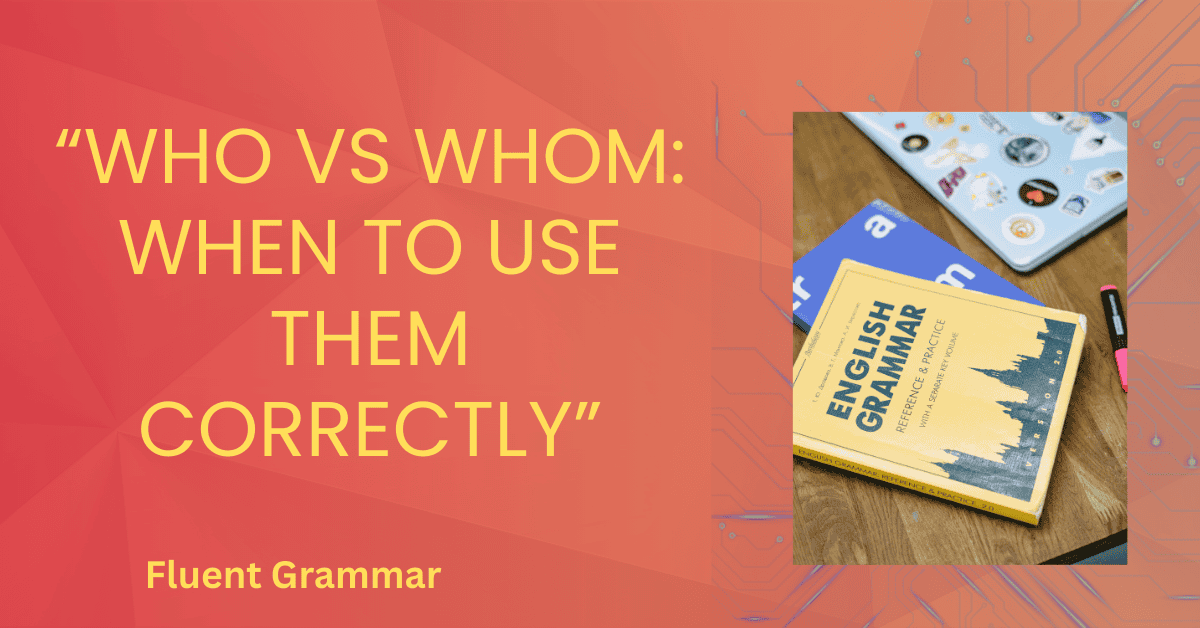Let’s be honest—”who vs whom” is such a tricky question that even native English speakers get bamboozled by it. Just like “its vs it’s“, “who vs whom” is another classic grammar trap.”
But here’s the good news: once you understand the basic difference, you’ll never be left guessing. In this post, I’ll break it down in a simple, no-fuss way with examples and an easy tip so you can remember it for good.
Table of Contents
Who vs Whom: What’s the Difference and When to Use Them?
Think of it like this:
- “Who” is used as the subject of a sentence (the one doing the action).
- “Whom” is used as the object (the one receiving the action).
Here are different cases to consider: –
When to use who
Case 1: As the subject of the verb, the nominative case “who” is used.
✅ Who broke into Jack’s house last night?
✅ It was George who spoke in favor of me.
In both sentences, “who” is the subject of the verbs broke and spoke, respectively.
Case 2: As the complement of the copular verb, the nominative case “who” is used.
✅ I know who that man is.
✅ Who is he.
In each sentence, “who” is the complement of the copular verb is, the subjects of is being that man and he, respectively.
When to use whom
Case 3: As the object of the verb or a preposition, the objective case “whom” is used.
✅ Whom do you hold accountable for this mishap? ( “whom” is the subject of the verb hold)
✅ Whom do you think he spoke to? ( “whom” is the subject of the preposition to)

💡 Quick Tip: Try the “He/Him” Test
If you’re unsure, swap in he or him:
- If he fits → use who
- If him fits → use whom
Let’s test it out:
✅ Who/Whom ate the last cookie?
→ He ate the cookie → ✅ Who is correct!
✅ To who/whom should I address the letter?
→ I should address the letter to him → ✅ Whom is correct!
For a more in-depth explanation, refer to Merriam-Webster’s guide on who vs whom.
Real-Life Examples
❌ Whom is calling me right now?
✅ Who is calling me right now?
❌ Who did you invite to the meeting?
✅ Whom did you invite to the meeting?
(You invited him, not he.)
❌ Whom wrote this amazing article?
✅ Who wrote this amazing article?
Why Does “Whom” Sound So Formal?
Let’s face it—most of us rarely say “whom” in everyday conversation. And that’s okay. In casual speech, many people just stick to “who.” But in formal writing, interviews, or professional emails, knowing when to use “whom” makes your grammar stand out, in a good way.
For a deeper dive into relative pronouns, check out Purdue OWL’s guide on relative pronouns.
When It’s Okay to Break the Rules (Yes, Really)
Language evolves over time, and “whom” is quite rare in modern usage. If you say “Who should I talk to?” instead of “Whom should I talk to?”—most people won’t notice. But for grammar lovers (like you and me!), using it correctly feels satisfying.
A Quick Recap
| Use This | When… | Example |
| Who | Is the subject | Who called you? (He called.) |
| Whom | Is the object | To whom did you speak? (Him) |
Final Thoughts
The “who vs whom” debate doesn’t have to be intimidating. Just remember the he/him test, and you’ll have this grammar rule in your pocket forever.
Do you have more tricky words in mind? Let me know in the comments—I’d love to cover them in my upcoming posts!

